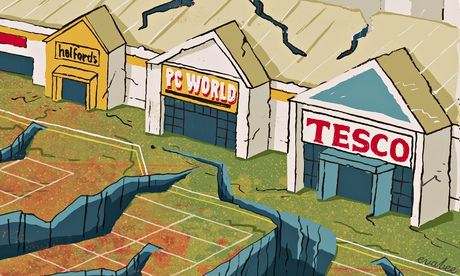Shuttered out-of-town retail stores will languish and become the coalition’s most visible legacy to the British environment

I have to admit, the Jenkins household now shops online. On Saturday morning the doorbell rings, and there stands a young man with the weekly supplies in neat recyclable bags. He has replaced the weekly trudge to the supermarket. Something may be lost, but a deal of time and shoe leather is saved.
I am one of millions: it is expected that 90% of the rise in British retail spending by 2016will be online. The age of the big supermarket, like that of the battleship, may limp on, but the glory days are over. One in five supermarkets needs to close, Goldman Sachs said this week, especially the gigantic ones.
Just last year Tesco’s former boss, Sir Terry Leahy, could go on Desert Island Discs andjeer at high streets as “medieval” and hail his superstores as “progress”. How times change. The City pages now call his company “a 1990s relic” and its stock “one notch above junk”. Its patsy accountants, PwC contrived to ignore a quarter-billion-pound hole in its accounts - imagine the outcry if a social worker were guilty of such professional oversight. The company now admits that “over-spacing” is its biggest handicap.
Two years ago Tesco’s rival, Sainsbury’s, dropped plans for 15 inner-city stores in favour of out-of-town ones, steered in that direction by the local government secretary, Eric Pickles. Now it is spending millions trying to write off an excess of 40 stores nationwide.Asda admits a “shockwave”, with its first fall in sales in eight years. They all blame “buyer promiscuity” – code for a free market we don’t like.
Drive anywhere in Britain today and you will see a grim phenomenon. Dotting the roadside, punctuating the high street, scattered through every suburb, are the carcasses of abandoned petrol stations. Once they were the future. To planners they could do no wrong. They broke all planning rules every couple of miles, lest the great god traffic ran out of fuel. Signs and canopies with garish logos defaced every village. Racks of groceries wiped out local stores. Now the ugly sites litter town and country alike. No one has the guts to demand their owners reinstate the land they despoiled.
For petrol station now read hypermarket. Since the disastrous reign of Margaret Thatcher’s environment secretary, Lord Ridley, they have bestrode every vista, especially if their name was Tesco. No planner dared stop them. They ring every settlement like siege engines round a medieval city, starving their commerce and undermining their communities. As recently as 2011, the big four supermarkets were planning to expand their trading floors by a staggering 50%. The rightwing thinktank Policy Exchange thought this was just terrific – the free market at full throttle.
Big supermarkets are dying. But if petrol stations left warts behind, supermarkets are leaving bubonic plague. Across the Atlantic, America’s 700 mega-shopping malls are in crisis: some, such as those of Akron, in Ohio, stand derelict, grass growing through their concrete, trees sprouting through defunct escalators. Some supermarkets may become warehouses for online distribution centres. Most will languish as cheap stores and homelessness shelters, like the high streets they ruined. Some will be replaced by bleak, ill-sited housing estates, part of the scarred, blotched landscape that is the coalition’s most visible legacy to the British environment.
Planning was certainly too rigid, but non-planning is far worse. The leads and lags of a free market in land impose huge “external costs” on the community. It was clearly wrong to allow an oversupply of out-of-town sites for competitive retailing, with no thought given to the impact on city centres or on local communities in general. The anti-green waste of energy, building material and infrastructure was never considered. The gods of the market triumphed.
There is no mystery here. If you want to kill a town centre, offer out-of-town sites to Tesco and Sainsbury’s – and build roads to help them. Thatcher, Blair and Cameron did just this. Shoppers had “market choice” for a year or two, then saw their towns “hollow out” and collapse. I watched it happen from rich Chichester in the south to poor Penrith in the north. The surest way of stalling the hopes of Ludlow of becoming a gourmet food centre was to allow the Earl of Plymouth to build an out-of-town “food centre” on the A49. Now watch Ludlow decay. This is not a free market, it is a stupid market.
Land is Britain’s most precious resource. The point of planning is to economise its usefulness. At present, smart planning ought to be thinking ahead of the boom in online shopping. What mistakes might there be in pandering to its gargantuan appetites? What are the implications of every street jammed with home delivery lorries? What of every suburb blighted with distribution centres, supplied by giant hangars littering every motorway?
Markets go in cycles. The job of planning is to even them out, not to exaggerate boom and bust. The out-of-town supermarket era has been brief, barely a quarter century old, but it has done as much damage to the countryside as it has to Britain’s urban cohesion. Its inflexible floor plates and characterless exteriors make even the ghosts of the industrial revolution look picturesque. They will blight the landscape for decades.
I am sure many big supermarkets will survive. The convenience ones in town are booming. The Institute of Grocery Distribution predicts they will grow by a third in the next five years. The law of futurology applies to them as to all once-doomed relics of the past, such as books, newspapers, the church, live theatre and jazz. Booms burn out, but every fashion finds its level and something of it survives.
I believe town and village centres will find a new role in the post-digital economy of “live experience”. Convenience itself has a value. High streets supply such personal services as coffee bars, beauty salons, tattoo parlours and gyms. After them will come market stalls, foodie counters, pop-up shops and junk vendors, the live activities of the new “smart city”.
The high street has no right to eternity but it can supply the framework in which a “small society” flourishes, far below the metropolitan scanner of the coalition’s big society. The high street should embody the ideal of a regulated free market. They tried to kill it, but what a mess we have made of bringing it back.
